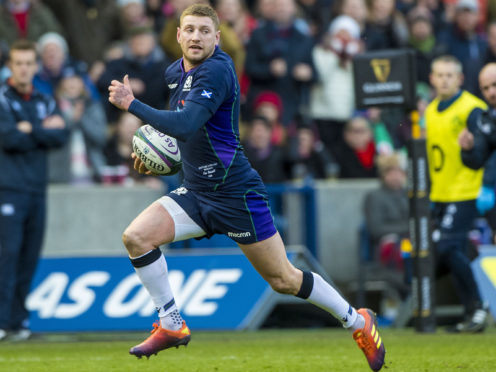The toddler reins and training wheels – figuratively of course – are off, and Finn Russell will assume a leadership for Scotland’s attacking game on his own as Scotland look to derail a major winning streak for the second year in succession against Wales at Murrayfield.
Only a few months ago there were plenty of laughs – even within the squad – as a meme featuring a mock-up of Greig Laidlaw babywalking Russell and Adam Hastings on training reins appeared on Twitter. It even ended up, in these days of ubiquitous social media, as the main picture on the Scotland team, WhatsApp group.
But Laidlaw will not be at the reins for Scotland tomorrow, and with so many other experienced heads missing, it’s down to Russell to lead Scotland’s stuttering attacking game.
New captain Stuart McInally has deferred responsibility for the attack game entirely to the stand-off, he said yesterday, no doubt hoping the Racing 10 – who missed the defeat in Paris – can repeat the mesmerising performance that was a key factor in beating the last “unbeatable” team to come to Murrayfield, England last year.
“I have a good relationship with Finn and I’ve asked him to lead the attack this week,” said McInally. “It’s not something I would ever want go in and talk about anyway, he knows that role better than anyone, being in that key 10 position.
“It’s good for me, being able to lean on someone like that. I can just say: `Right, that’s your area’, and I can then focus on what I need to focus on.
“He’s a great leader. He’s very precise and knows exactly what he wants from everyone around him. He’s clear in that and he works so hard, on and off the pitch. He’s a key player for us.”
McInally admitted to a sense of frustration in the squad at not doing themselves justice so far in this championship, but a clear determination to prove wrong everyone who thinks they have no chance of derailing Wales’ Grand Slam ambitions.
“Personally I ignore that sort of stuff but it can motivate a few people,” said the skipper. “I’ve just asked the players to do whatever they need to do to be ready for a massive Test match tomorrow. However they get fuelled is up to them.
“When you feel you have the potential and feel you are not living up to it, it is frustrating. We know we need to bring an edge in the game and we know it is not just going to happen.
“We bring the edge in training, we rehearse it and we practice this and the good thing now is that everybody knows their roles and the game plan and planned moves. It is just the top two inches now.”
One idea gaining ground – mostly from an interview with the legend that is Jim Telfer, who hardly knows any of these players now – is that the Scots aren’t hard enough, but McInally says that the intensity of training sessions sometimes spills over.
“It’s never uncontrolled, but we mimic what we expect in Test matches, which is a high level of intensity,” he said. “Whether we’re training against each other or the under-20s, there is a group who are the starters, then a group who aren’t involved – and they’re so important for us to bring that intensity.
“You have to replicate that so it’s not a surprise when you come to the game. The best performances I’ve been involved in have been when you can feel that edge in training, and we’ve had that this week.
“I don’t know about those old-style sessions, but (with us) it has boiled over on occasion. But no, not this week.”
But there is huge respect for their forebears, and there’s almost a constant reminder of the past in training camp and the dressing room.
“It’s throughout the whole campaign,” continued McInally. “Gregor (Townsend) is big on watching clips of old Scotland teams scoring tries at Murrayfield.
“Even in the changing rooms, when you look on your peg, there’s a list of everyone who has worn the jersey before you.
“There are so many ways to be motivated for Scotland. That’s just one of them.”


